 W
WA war of independence or independence war is a conflict occurring over a territory that has declared independence from some nation-state or ruling colonial power. Once the state that previously held the territory sends in military forces to assert its sovereignty or the native population clashes with the former occupier, a separatist rebellion has begun. If a new state is successfully established, the conflict is usually known as a 'War of Independence'.
 W
WThe 1947–1949 Palestine war, known in Israel as the War of Independence and in Arabic as The Nakba, was fought in the territory of Palestine under the British Mandate. It is the first war of the Israeli–Palestinian conflict and the broader Arab–Israeli conflict. During this war, the British Empire withdrew from Mandate Palestine, which had been a province (eyalet) of the Ottoman Empire before British occupation in 1917. The war culminated in the establishment of the State of Israel by the Jews, and saw the complete demographic transformation of Palestine, with the displacement of around 700,000 Palestinian Arabs and the complete destruction of most of their villages, towns and cities. The Palestinian Arabs ended up stateless, displaced either to the Palestinian territories captured by Egypt and Jordan or to the surrounding Arab states; many of them, as well as their descendants, remain stateless and in refugee camps.
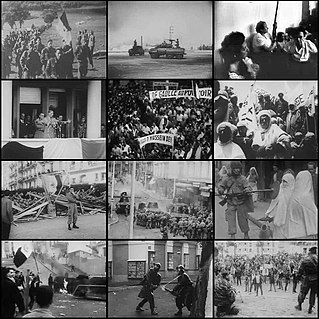 W
WThe Algerian War, also known as the Algerian War of Independence or the Algerian Revolution, and in Algeria itself sometimes called The War of 1 November, was fought between France and the Algerian National Liberation Front from 1954 to 1962, which led to Algeria winning its independence from France. An important decolonization war, it was a complex conflict characterized by guerrilla warfare, maquis fighting, and the use of torture. The conflict also became a civil war between the different communities and within the communities. The war took place mainly on the territory of Algeria, with repercussions in metropolitan France.
 W
WThe American Civil War was a civil war in the United States from 1861 to 1865, fought between northern states loyal to the Union and southern states that had seceded to form the Confederate States of America. The civil war began primarily as a result of the long-standing controversy over the enslavement of black people. War broke out in April 1861 when secessionist forces attacked Fort Sumter in South Carolina just over a month after Abraham Lincoln had been inaugurated as the President of the United States. The loyalists of the Union in the North, which also included some geographically western and southern states, proclaimed support for the Constitution. They faced secessionists of the Confederate States in the South, who advocated for states' rights to uphold slavery.
 W
WThe American Revolutionary War (1775-1783), also known as the American War of Independence, was initiated by the thirteen original colonies in Congress against the Kingdom of Great Britain over their objection to Parliament's direct taxation and its lack of colonial representation. From their founding in the 1600s, the colonies were largely left to govern themselves. When France left North America in 1763, the British Empire expanded, and the elected part of the colonial legislatures challenged how the new expenses should be paid. The new 1765 Stamp Act and 1767-1768 Townshend Acts provoked colonial opposition and unrest, leading to the 1770 Boston Massacre and 1773 Boston Tea Party. When Parliament answered with punitive measures on Massachusetts, twelve colonies responded with the First Continental Congress to boycott British goods.
 W
WThe Anglophone Crisis, also known as the Ambazonia War, or the Cameroonian Civil War, is a conflict in the Southern Cameroons region of Cameroon, part of the long-standing Anglophone problem. In September 2017, separatists in the Anglophone territories of Northwest Region and Southwest Region declared the independence of Ambazonia and began fighting against the Government of Cameroon. Starting as a low-scale insurgency, the conflict spread to most parts of the Anglophone regions within a year. By the summer of 2019, the government controlled the major cities and parts of the countryside, while the separatists held parts of the countryside and regularly appeared in the major cities. A year later, clearly-defined frontlines had emerged, sometimes with a tacit mutual understanding between the belligerents on who controls which areas; while Cameroon would raid separatist-controlled towns and villages, it would not seek to outright recapture them, focusing instead on securing the major urban areas.
 W
WThe Angolan War of Independence, called in Angola the Luta Armada de Libertação Nacional, began as an uprising against forced cultivation of cotton, and it became a multi-faction struggle for the control of Portugal's overseas province of Angola among three nationalist movements and a separatist movement. The war ended when a leftist military coup in Lisbon in April 1974 overthrew Portugal's Estado Novo regime, and the new regime immediately stopped all military action in the African colonies, declaring its intention to grant them independence without delay.
 W
WThe annexation of the Leeward Islands or the Leewards War was a series of diplomatic and armed conflicts between the French Third Republic and the native kingdoms of Raiatea-Tahaa, Huahine and Bora Bora, which resulted in the conquest of the Leeward Islands, in the South Pacific archipelago of the Society Islands in modern-day French Polynesia.
 W
WThe 1948 Arab–Israeli War was the second and final stage of the 1947–49 Palestine war. It formally began following the end of the British Mandate for Palestine at midnight on 14 May 1948; the Israeli Declaration of Independence had been issued earlier that day, and a military coalition of Arab states entered the territory of British Palestine in the morning of 15 May.
 W
WAyalon Institute was an underground ammunition factory, located on Kibbutz Hill in Rehovot, Israel, disguised as a kibbutz that ran a laundry service. The factory was established in 1945 and manufactured ammunition until 1948; today it is a museum and national historical site. It was “secretly created in less than a month, 8 meters underground and was run by the Haganah".
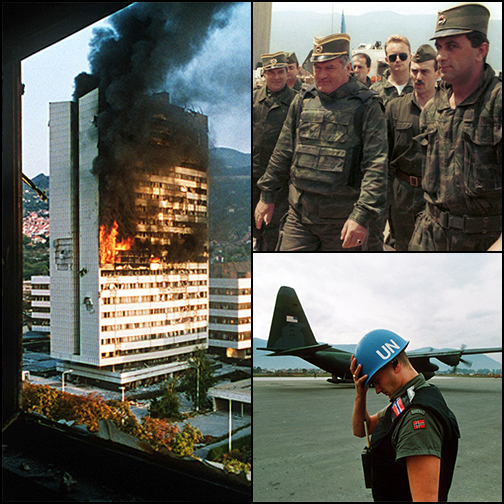 W
WThe Bosnian War was an international armed conflict that took place in Bosnia and Herzegovina between 1992 and 1995. Following a number of violent incidents in early 1992, the war is commonly viewed as having started on 6 April 1992. The war ended on 14 December 1995. The main belligerents were the forces of the Republic of Bosnia and Herzegovina and those of Herzeg-Bosnia and Republika Srpska, proto-states led and supplied by Croatia and Serbia, respectively.
 W
WThe Central Executive Committee in the Philippines was an insurgent revolutionary government temporarily established by Francisco Macabulos on April 17, 1898, shortly after the December 14, 1897 signing of the Pact of Biak-na-Bato. That pact established a truce between Spanish colonial authorities in the Philippines and the revolutionary Republic of Biak-na-Bato calling for the exile of Emilio Aguinaldo and other senior revolutionaries. The exiled revolutionariess formed the Hong Kong Junta, and the Central Executive Committee was intended to remain in existence the Philippines, "until a general government of the Republic in these islands shall again be established, with a constitution which provided for a President, Vice President, Secretary of War and Secretary of the Treasury.." The Committee was dissolved shortly after Aguinaldo's May 19, 1898 return to the Philippines.
 W
WThe Chechen–Russian conflict is the centuries-long conflict, often armed, between the Russian government and various Chechen forces. Formal hostilities date back to 1785, though elements of the conflict can be traced back considerably further.
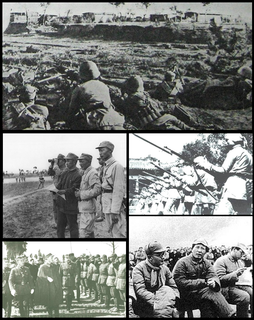 W
WThe Chinese Civil War was a civil war in China fought between the Kuomintang (KMT)-led government of the Republic of China (ROC) and the Communist Party of China (CPC) lasting intermittently between 1927 and 1949. The war is generally divided into two phases with an interlude: from August 1927 to 1937, the KMT-CPC Alliance collapsed during the Northern Expedition, and the Nationalists controlled most of China. From 1937 to 1945, hostilities were put on hold, and the Second United Front fought the Japanese invasion of China with eventual help from the Allies of World War II. The civil war resumed with the Japanese defeat, and the CPC gained the upper hand in the final phase of the war from 1945 to 1949, generally referred to as the Chinese Communist Revolution.
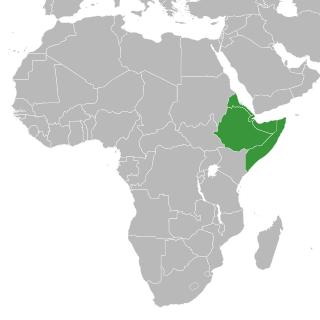 W
WConflicts in the Horn of Africa have been occurring since the 17th century BCE. The Horn of Africa includes the nations of Djibouti, Eritrea, Ethiopia, Somalia and Somaliland.
 W
WThe Croatian War of Independence was fought from 1991 to 1995 between Croat forces loyal to the government of Croatia—which had declared independence from the Socialist Federal Republic of Yugoslavia (SFRY)—and the Serb-controlled Yugoslav People's Army (JNA) and local Serb forces, with the JNA ending its combat operations in Croatia by 1992. In Croatia, the war is primarily referred to as the "Homeland War" and also as the "Greater-Serbian Aggression". In Serbian sources, "War in Croatia" and (rarely) "War in Krajina" are used.
 W
WThe Dominican Independence War gave the Dominican Republic autonomy from Haiti on February 27, 1844. Before the war, the island of Hispaniola had been united under the Haitian government for a period of 22 years when the newly independent nation, previously known as the Captaincy General of Santo Domingo, was unified with Haiti in 1822. The criollo class within the country overthrew the Spanish crown in 1821 before unifying with Haiti a year later.
 W
WThe Dos de Mayo or Second of May Uprising of 1808 was a rebellion by the people of Madrid against the occupation of the city by French troops, provoking repression by the French Imperial forces.
 W
WThe Eighty Years' War or Dutch War of Independence (1568–1648) was a revolt of the Seventeen Provinces of what are today the Netherlands, Belgium, and Luxembourg against Philip II of Spain, the sovereign of the Habsburg Netherlands. After the initial stages, Philip II deployed his armies and regained control over most of the rebelling provinces. Under the leadership of the exiled William the Silent, the northern provinces continued their resistance. They eventually were able to oust the Habsburg armies, and in 1581 they established the Republic of the Seven United Netherlands. The war continued in other areas, although the heartland of the republic was no longer threatened. This included the origins of the Dutch colonial empire, which began with Dutch attacks on Portugal's overseas territories. At the time, this was conceived as carrying the war with the Spanish Empire overseas due to Portugal and Spain's being in a dynastic union.
 W
WThe First Balkan War lasted from October 1912 to May 1913 and involved actions of the Balkan League against the Ottoman Empire. The Balkan states' combined armies overcame the initially numerically inferior and strategically disadvantaged Ottoman armies and achieved rapid success.
 W
WThe First Chechen War, also known as the First Chechen Сampaign, or First Russian-Chechen war, was a rebellion by the Chechen Republic of Ichkeria against the Russian Federation, fought from December 1994 to August 1996. After the initial campaign of 1994–1995, culminating in the devastating Battle of Grozny, Russian federal forces attempted to seize control of the mountainous area of Chechnya but were set back by Chechen guerrilla warfare and raids on the flatlands despite Russia's overwhelming advantages in firepower, manpower, weaponry, artillery, combat vehicles, airstrikes and air support. The first war was preceded by the Russian Intervention in Ichkeria, in which Russia tried to covertly overthrow the Ichkerian government. The resulting widespread demoralization of federal forces and the almost universal opposition of the Russian public to the conflict led Boris Yeltsin's government to declare a ceasefire with the Chechens in 1996 and sign a peace treaty a year later.
 W
WThe First Indochina War began in French Indochina on December 19, 1946, and lasted until July 20, 1954. Fighting between French forces and their Việt Minh opponents in the south dated from September 1945. The conflict pitted a range of forces, including the French Union's French Far East Expeditionary Corps, led by France and supported by Bảo Đại's Vietnamese National Army against the Việt Minh, led by Hồ Chí Minh and the People's Army of Vietnam led by Võ Nguyên Giáp. Most of the fighting took place in Tonkin in northern Vietnam, although the conflict engulfed the entire country and also extended into the neighboring French Indochina protectorates of Laos and Cambodia.
 W
WThe Franco-Tahitian War or French–Tahitian War (1844–1847) was a conflict between the Kingdom of the French and the Kingdom of Tahiti and its allies in the South Pacific archipelago of the Society Islands in modern-day French Polynesia.
 W
WThe Guinea-Bissau War of Independence was an armed independence conflict that took place in Portuguese Guinea between 1963 and 1974. Fought between Portugal and the African Party for the Independence of Guinea and Cape Verde, an armed independence movement backed by Cuba and the Soviet Union, the war is commonly referred to as "Portugal's Vietnam" due to the large numbers of men and amounts of material expended in a long, mostly guerrilla war and the internal political turmoil it created in Portugal. The war ended when Portugal, after the Carnation Revolution of 1974, granted independence to Guinea-Bissau, followed by Cape Verde a year later.
 W
WThe Haitian Revolution was a successful insurrection by self-liberated slaves against French colonial rule in Saint-Domingue, now the sovereign state of Haiti. The revolt began on 22 August 1791, and ended in 1804 with the former colony's independence. It involved blacks, mulattoes, French, Spanish, and British participants—with the ex-slave Toussaint Louverture emerging as Haiti's most charismatic hero. The revolution was the only slave uprising that led to the founding of a state which was both free from slavery, and ruled by non-whites and former captives. It is now widely seen as a defining moment in the history of the Atlantic World.
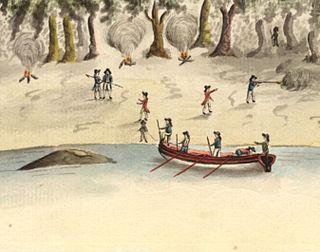 W
WThe Hawkesbury and Nepean Wars (1794–1816) were a series of conflicts where British forces, including armed settlers and detachments of the British Army in Australia, fought against Indigenous clans inhabiting the Hawkesbury River region and the surrounding areas to the west of Sydney. The wars began in 1794, when the British started to construct farms along the river, some of which were established by soldiers.
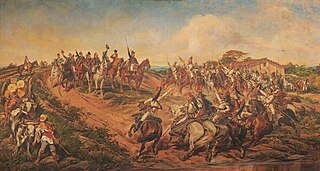 W
WThe Independence of Brazil comprised a series of political and military events that occurred in 1821–1824, most of which involved disputes between Brazil and Portugal regarding the call for independence presented by the Brazilian Empire.
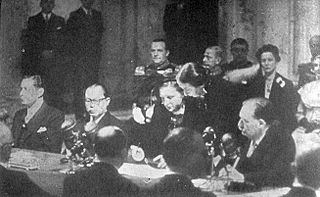 W
WThe Indonesian National Revolution, or Indonesian War of Independence, was an armed conflict and diplomatic struggle between the Republic of Indonesia and the Dutch Empire and an internal social revolution during postwar and postcolonial Indonesia. It took place between Indonesia's declaration of independence in 1945 and the Netherlands' recognition of Indonesia's independence at the end of 1949.
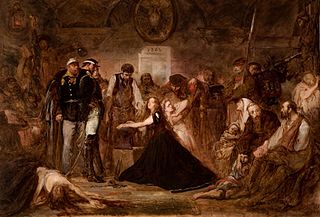 W
WThe January Uprising was an insurrection principally in Russia′s Kingdom of Poland aimed at the restoration of the Polish–Lithuanian Commonwealth. It began on 22 January 1863 and continued until the last insurgents were captured by the Russian forces in 1864.
 W
WJeroboam's Revolt was an armed insurrection against Rehoboam, king of the United Monarchy of Israel, and subsequently the Kingdom of Judah, led by Jeroboam in the late 10th century BCE, according to the First Book of Kings and the Second Book of Chronicles of the Hebrew Bible. The conflict, referring to the independence of the Kingdom of Samaria and the subsequent civil war during Jeroboam's rule, began shortly after the death of Solomon and lasted until the Battle of Mount Zemaraim. The conflict began due to discontent under the rule of Solomon's successor, his son Rehoboam, and was waged with the goal of breaking away from the United Monarchy of Israel. Though this goal was achieved very early on in the conflict, the war continued throughout the duration of Rehoboam's reign and well into the reign of his son, Abijam, who defeated the armies of Jeroboam but failed to reunite the kingdoms.
 W
WThe Jewish insurgency in Mandatory Palestine, known in the United Kingdom as the Palestine Emergency, was a paramilitary campaign carried out by Zionist underground groups against British rule in Mandatory Palestine. The tensions between the Zionist underground and the British mandatory authorities rose from 1938 and intensified with the publication of the White Paper of 1939. The Paper outlined new government policies to place further restrictions on Jewish immigration and land purchases, and declared the intention of giving independence to Palestine, with an Arab majority, within ten years. Though World War II brought relative calm, the tensions again escalated into an armed struggle towards the end of the war, when it became clear that the Axis powers were close to defeat.
 W
WThe Latvian War of Independence, sometimes called the Latvia's freedom fights or the Latvian War of Liberation, was a series of military conflicts in Latvia between 5 December 1918, after the newly proclaimed Republic of Latvia was invaded by Soviet Russia, and the signing of the Latvian-Soviet Riga Peace Treaty on 11 August 1920.
 W
WThe Malayan Emergency was a guerrilla war fought in the Federation of Malaya from 1948 until 1960. The conflict was between Commonwealth armed forces and pro-independence fighters of the Malayan National Liberation Army (MNLA), the military wing of the Malayan Communist Party (MCP). The war was fought over attempts by communist forces to gain independence for Malaya from the British Empire and to establish a socialist economy. The fighting spanned both the colonial period and the creation of an independent Malaya (1957). Although it was referred to as "The Emergency" by colonial authorities, the MNLA referred to it as the "Anti-British National Liberation War". The conflict was called an "Emergency" by the British for insurance purposes, as London-based insurers would not have paid out in instances of civil wars.
 W
WThe Mali War is an ongoing armed conflict that started in January 2012 between the northern and southern parts of Mali in Africa. On 16 January 2012, several insurgent groups began fighting a campaign against the Malian government for independence or greater autonomy for northern Mali, which they called Azawad. The National Movement for the Liberation of Azawad (MNLA), an organization fighting to make this area of Mali an independent homeland for the Tuareg people, had taken control of the region by April 2012.
 W
WThe Mau Mau Uprising (1952–1960), also known as the Mau Mau Rebellion, the Kenya Emergency, and the Mau Mau Revolt, was a war in the British Kenya Colony (1920–1963) between the Kenya Land and Freedom Army (KLFA), also known as Mau Mau, and the British authorities.
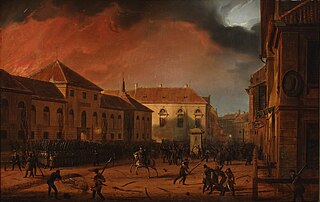 W
WThe November Uprising (1830–31), also known as the Polish–Russian War 1830–31 or the Cadet Revolution, was an armed rebellion in the heartland of partitioned Poland against the Russian Empire. The uprising began on 29 November 1830 in Warsaw when the young Polish officers from the local Army of the Congress Poland's military academy revolted, led by lieutenant Piotr Wysocki. Large segments of the peoples of Lithuania, Belarus, and the Right-bank Ukraine soon joined the uprising. Although the insurgents achieved local successes, a numerically superior Imperial Russian Army under Ivan Paskevich eventually crushed the uprising. The Russian Emperor Nicholas I decreed that henceforth Russian-occupied Poland would lose its autonomy and become an integral part of the Russian Empire. With Warsaw little more than a military garrison, its university closed.
 W
WPemulwuy was an Aboriginal Australian of Eora descent, born around 1750 in the area of Botany Bay in New South Wales. He is noted for his resistance to the European settlement of Australia which began with the arrival of the First Fleet in January 1788. He is believed to have been a member of the Bidjigal (Bediagal) clan of the Eora people. The Bidjigal people are the original inhabitants of Toongabbie and Parramatta in Sydney.
 W
WThe Peninsular War (1807–1814) is the military conflict fought by Spain and Portugal, assisted by the United Kingdom, against the invading and occupying forces of the France for control of the Iberian Peninsula during the Napoleonic Wars. In Spain, it is considered to overlap with the Spanish War of Independence. The war began when the French and Spanish armies invaded and occupied Portugal in 1807 by transiting through Spain, and it escalated in 1808 after Napoleonic France had occupied Spain, which had been its ally. Napoleon Bonaparte forced the abdications of Ferdinand VII and his father Charles IV and then installed his brother Joseph Bonaparte on the Spanish throne and promulgated the Bayonne Constitution. Most Iberians rejected French rule and fought a bloody war to oust them. The war on the peninsula lasted until the Sixth Coalition defeated Napoleon in 1814, and it is regarded as one of the first wars of national liberation and is significant for the emergence of large-scale guerrilla warfare.
 W
WThe Philippine Revolution, called the Tagalog War by the Spanish, was a revolution and subsequent conflict fought between the people and insurgents of the Philippines and the Spanish colonial authorities of the Spanish East Indies, under the Spanish Empire.
 W
WThe Philippine–American War, also referred to as the Filipino–American War, the Philippine War, the Philippine Insurrection or the Tagalog Insurgency, was an armed conflict between the First Philippine Republic and the United States that lasted from February 4, 1899 to July 2, 1902. While Filipino nationalists viewed the conflict as a continuation of the struggle for independence that began in 1896 with the Philippine Revolution, the U.S. government regarded it as an insurrection. The conflict arose when the First Philippine Republic objected to the terms of the Treaty of Paris under which the United States took possession of the Philippines from Spain, ending the Spanish–American War.
 W
WRákóczi's War of Independence (1703–11) was the first significant attempt to topple the rule of the Habsburgs over Hungary. The war was fought by a group of noblemen, wealthy and high-ranking progressives and was led by Francis II Rákóczi. The insurrection was unsuccessful, ending with the Treaty of Szatmár; however, the Hungarian nobility managed to partially satisfy Hungarian interests.
 W
WThe Romanian War of Independence is the name used in Romanian historiography to refer to the Russo-Turkish War (1877–78), following which Romania, fighting on the Russian side, gained independence from the Ottoman Empire. On April 16 [O.S. April 4] 1877, Romania and the Russian Empire signed a treaty at Bucharest under which Russian troops were allowed to pass through Romanian territory, with the condition that Russia respected the integrity of Romania. Consequently, the mobilization of the Romanian troops also began, and about 120,000 soldiers were massed in the south of the country to defend against an eventual attack of the Ottoman forces from south of the Danube. On April 24 [O.S. April 12] 1877, Russia declared war on the Ottoman Empire and its troops entered Romania through the newly built Eiffel Bridge, on their way to the Ottoman Empire. Due to great losses, the Russian Empire asked Romania to intervene. On July 24 [O.S. July 12] 1877, the first Romanian Army units crossed the Danube and joined forces with the Russian Army.
 W
WThe Wars of Scottish Independence were a series of military campaigns fought between the Kingdom of Scotland and the Kingdom of England in the late 13th and early 14th centuries.
 W
WThe Second Chechen War, also known as the Second Chechen Сampaign ) or the Second Russian invasion of Chechnya from the rebel Chechen point of view, was an armed conflict on the territory of Chechnya and the border regions of the North Caucasus between the Russian Federation and the Chechen Republic of Ichkeria, also with militants of various Islamist groups, fought from August 1999 to April 2009.
 W
WThe Second Serbian Uprising was the second phase of the Serbian Revolution against the Ottoman Empire, which erupted shortly after the re-annexation of the country to the Ottoman Empire in 1813. The occupation was enforced following the defeat of the First Serbian Uprising (1804–1813), during which Serbia existed as a de facto independent state for over a decade. The second revolution ultimately resulted in Serbian semi-independence from the Ottoman Empire. The Principality of Serbia was established, governed by its own parliament, constitution and royal dynasty. De jure independence, however, was attained in 1878, following the decisions of the Congress of Berlin.
 W
WThe Swedish War of Liberation, also known as Gustav Vasa's Rebellion and the Swedish War of Secession, was a rebellion and a civil war in which the nobleman Gustav Vasa successfully deposed King Christian II from the throne of Sweden, ending the Kalmar Union between Sweden, Norway, and Denmark.
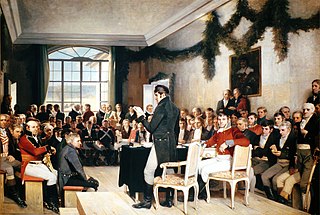 W
WThe Swedish–Norwegian War, also known as the Campaign against Norway, War with Sweden 1814, or the Norwegian War of Independence, was a war fought between Sweden and Norway in the summer of 1814. The war was a Swedish victory and led to Norway being forced into the United Kingdoms of Sweden and Norway, a union with Sweden under the Swedish king Charles XIII but with Norway having its own constitution and parliament.
 W
WThe Ten-Day War, or the Slovenian War of Independence, was a brief conflict that followed Slovenia's declaration of independence from Yugoslavia on 25 June 1991. It was fought between the Slovenian Territorial Defence and the Yugoslav People's Army (JNA). It lasted from 27 June 1991 until 7 July 1991, when the Brioni Accords were signed. It marked the beginning of the Yugoslav Wars.
 W
WThe Tuareg Rebellion of 2012 was an early stage of the Mali War; from January to April 2012, a war was waged against the Malian government by rebels with the goal of attaining independence for the northern region of Mali, known as Azawad. It was led by the National Movement for the Liberation of Azawad (MNLA) and was part of a series of insurgencies by traditionally nomadic Tuaregs which date back at least to 1916. The MNLA was formed by former insurgents and a significant number of heavily armed Tuaregs who fought in the Libyan Civil War.
 W
WThe Ukrainian War of Independence, a period of sustained warlike conflict, lasted from 1917 to 1921 and resulted in the establishment and development of a Ukrainian republic, most of which was later absorbed into the Soviet Union as the Ukrainian Soviet Socialist Republic of 1922–1991.
 W
WThe battle of Valdepeñas was a popular uprising that took place on 6 June 1808, at the beginning of the Spanish War of Independence, in the town of Valdepeñas, Ciudad Real, Castile-La Mancha. Valdepeñas is on the main road from Madrid to Andalusia.
 W
WThe War of Independence of Brazil was waged between the newly independent Brazilian Empire and the United Kingdom of Portugal, Brazil and the Algarves, which had just undergone the Liberal Revolution of 1820. It lasted from February 1822, when the first skirmishes took place, to March 1824, with the surrender of the Portuguese garrison in Montevideo. The war was fought on land and sea and involved both regular forces and civilian militia. Land and naval battles took place in the territories of Bahia, Cisplatina and Rio de Janeiro provinces, the vice-kingdom of Grão-Pará, and in Maranhão and Pernambuco, which today are part of Ceará, Piauí and Rio Grande do Norte states.
 W
WWars of national liberation or national liberation revolutions are conflicts fought by nations to gain independence. The term is used in conjunction with wars against foreign powers to establish separate sovereign statess for the rebelling nationality. From a different point of view, such wars are called insurgencies, rebellions, or wars of independence. Guerrilla warfare or asymmetric warfare is often utilized by groups labeled as national liberation movements, often with support from other states.
 W
WThe Western Togoland Rebellion is an ongoing separatist revolt by the Ewe nationalist Western Togoland Restoration Front against the government of Ghana seeking the independence of former British Togoland.
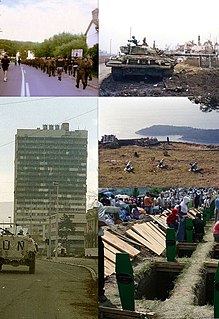 W
WThe Yugoslav Wars were a series of separate but related ethnic conflicts, wars of independence, and insurgencies fought in the former Yugoslavia from 1991 to 2001, which led to the breakup of the Yugoslav state. Its constituent republics declared independence, despite unresolved tensions between ethnic minorities in the new countries, fueling the wars.